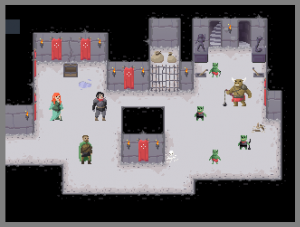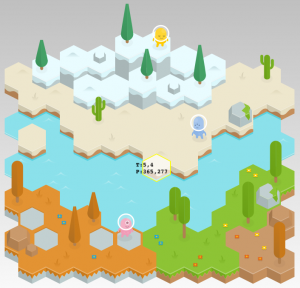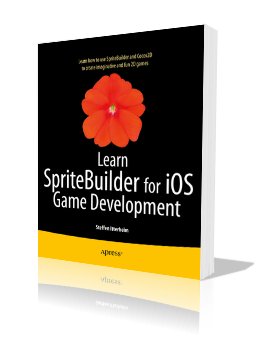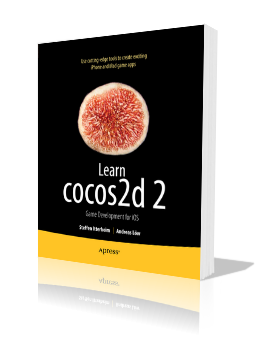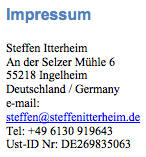You may have heard about the Appvent Calendar by Blacksmith Games, creators of Floop and Plushed. From that idea emerged the popular Free App A Day website.
I thought, maybe I can take this idea and transform it into something slightly different: the Cocos2D Linkvent Calendar 2010. The idea being that I publish a blog post every day in December 2010 - you know, the month that ends after 24 days in that culminating event that will crash the App Store and end humanity’s existence. Or so I’ve heard. Each blog post will link to your website, blog post, tutorial, product, open source project or whatever else that might be of interest specifically to Cocos2D for iPhone developers, as long as it is “your thing”.
As my blog is closing in on 5,000 visits a week and my Twitter account is followed by over 1,400 hummingbirds and more and more of my book readers will come here and check out the site, I think that would be a nice gift to anyone who is interested in receiving some traffic from me. What you do to deserve a link is up to you. This is your chance to make your blog better known, or even kickstart it. The better and more relevant the content is to Cocos2D developers, the better your chances are that some of this traffic will stick, in form of return visits.
What you can do
Just to give you a few ideas:
- write a postmortem of your game, and your game will surely get a few extra sales as well
- open source your previous game’s source code, and in turn announce your new project
- lower the price of your commercial product on that day
- receive more attention for your technical essay about some aspect(s) of Cocos2D
- write an awesome tutorial, for example about integrating UIKit controls in a Cocos2D project
The only thing that’s important is that the article, website, product, game, etc. is somehow relevant and of interest to Cocos2D developers. So if you “only” have a game made with Cocos2D, you should spice that up by, for example, talking about your development experience or explaining how you solved some tricky aspects of the game’s source code, including examples.
Accepting Offers Now!
I’m accepting offers now and until all 24 slots are filled, while holding a few reserve slots just in case. Please send all link requests by email to linkvent (at) learn-cocos2d.com - you don’t want to spoil the fun by posting it as a comment!
Also, you can reserve a slot by letting me know what you have in mind and are going to do, without actually having to have something to link to right now. You should be able to prepare and publish your content by early to mid December though.
I probably can’t answer all request, but if I do include yours then you’ll get a notice when I’ll publish it. Keep in mind that I will publish posts on midnight Central European Time (CET) (UTC+1), so you may have to factor in time zone differences.
Note: this is all about helping individual developers and products receive the attention they deserve while giving Cocos2D developers some useful information to digest. For that reason, I won’t link to posts on forums, wikis or other aggregating sites, to Apps on iTunes or to a code repository with just some files in it. There ought to be something to read, a little guidance if you will, and it should come from you, and it should be connected to you by putting that up on your blog or website. You can then of course link from your post to wherever you like.
Just today I was informed that the eBook version of Learn iPhone and iPad Cocos2D Game Development is now available in its final form!
UPDATE: the source code download (also on the book’s page, left side, under Book Resources) now includes all of the source code.
The print edition will follow sometime soon, hopefully within the next ~3 weeks.
On a related note, Ray Wenderlich joined forces with Rod Strougo to help finish Rod’s Cocos2D book, due to an oddly scheduled release date whose publisher apparently feels impossible to postpone. By that I mean to say: Rod’s wife is having a baby. Congratulations to that, and the book! 
I was thinking, Ansca Mobile is giving out so many coupon codes - why not do the same? 
Actually, I have another reason for that. Just a few days ago I received emails from 3 different developers who stated their case and asked me to sell the kit to them for a much lower price, or give it away for free. On one hand, I feel with them. On the other hand, if all it needs is to ask me to give it away for free, and people got wind of that, I could just release it to the public domain to prevent myself from being flooded with emails. 😀
So I’ve sent those three a coupon code each, and give everyone else a chance to get in on the 50% off deal as well. Note that this coupon code is limited to 20 uses, so it’ll work only for the next 20 customers!
50% OFF - NOW: $89,50
With the following coupon code, you’ll get the Line-Drawing Game Starterkit 50% off - it only costs $89,50 with the coupon code! Just enter this code when making the purchase in the “Coupon Code” box:
LINEDRAWINGKIT4YOU
Visit the Line-Drawing Starterkit product page.
IMPORTANT: this coupon code is limited to 20 uses, it’ll work only for the next 20 customers!
Starterkit update for Cocos2D v0.99.5
I intend to update the Starterkit to support Cocos2D v0.99.5 once that’s stable. With the recent release of a release candidate (RC) I’m being hopeful that the stable version will be ready soon. With the update the Starterkit will also support HD/Retina displays.
My Cocos2D Xcode project is now on Github. Open-source, free, properly MIT Licensed, includes the rootViewController and supports Cocos2D v0.99.5 rc0.
I’m also working on (with) a greatly enhanced version of the Xcode project. It integrates wax (Lua) and a Game Object Component System that i termed “gocos”. Also comes with a lot more useful convenience classes.
But the big idea is to actually upload (or link within github, if I can figure out if and how that works) all dependent projects into one repository, so that you can download everything at once and it works out of the box. Currently there are 3 projects referenced by cocos2d-project: gocos (let’s call it a library of convenience and gameplay code for Cocos2D), wax (Lua support) and obviously cocos2d-iphone. So everything that’s needed is going to be bundled in one big package, which voids all of the version incompatibility issues.
You can still experiment with different versions of these libraries but in that case I think you know what you’re doing and that issues are to be expected. But being a github repository, you can of course clone and commit changes.
Appetizer
Here’s what I’ve done with Lua. I’m currently using it only as a better plist replacement for settings. It’s better than plist because you can comment on each item, you can sort them easily, you can run functions and algorithms to generate values or load additional data, and in general it’s a lot easier to work with than the plist editor. Here’s a reduced config.lua that is loaded at runtime into a hierarchy of NSDictionary objects:
[cc lang=”lua”]
local config =
{
AccelerometerControls =
{
UpdatesPerSecond = 60, — 60 Hz
Responsiveness = 0.997,
SensitivityX = -2,
SensitivityY = 2,
MaxVelocity = 100,
},
}
return config
[/cc]
And this line of code loads these values and assigns them to the correspondingly named properties of the target class:
[cc lang=”objc”]
[Config loadPropertiesFromKeyPath:@”AccelerometerControls” target:self];
[/cc]
That’s all you need to do to transfer the values from config.lua into a class instance. Huge timesaver! The only drawback is that it currently can’t differentiate between float, int and bool (due to NSNumber), so it currently only supports float properties.
I got an email from Apress. They say the Learn Cocos2D Alpha Book “enjoys an unprecedented success”. Other phrases in that email include “staggering number” (which I can’t disclose) and “great positive feedback”.
Wow, just wow! 
What’s more, it looks like the book will be released early. Currently, it is scheduled for release on November 30th, 2010. This is still a rough date though, and street date may be off by a couple days.
And here I thought Zwoptex, and that’s going to be it in terms of Texture Atlas creation. Much to my surprise I found the TexturePacker tool. But in comparison to Zwoptex, it doesn’t have a GUI, it’s a command line utility. On the other hand, it does everything automatically and is probably going to be a great choice for any automated procession. It can output in both Cocos2D and Corona formats.
The TexturePacker is available from the code’n’web website and costs around $15 (€10).
It has a few very interesting features, for example removal of duplicate images and color reduction. Check out the feature comparison chart on the Cocos2D wiki.
Due to a number of breaking changes in the recent Cocos2D beta versions, including the rename of the Cocos2D project to cocos2d-ios.xcodeproj, I’ve made an update to my Xcode project. You know, the one from this tutorial that allows you to keep Cocos2D completely seperate from your own code, which in turn enables you to easily and safely up- and downgrade Cocos2D by merely replacing the Cocos2D folder.
So now it also works with Cocos2D and here is the download:
Download the Xcode Project (Cocos2D v0.99.5 beta 3 and later)
What you have to do to upgrade the project, in case you already started a project with my older Xcode template but would like to upgrade to Cocos2D v0.99.5 beta 3:
- remove the cocos2d-iphone project from your Xcode project
- follow these instructions from Select the Project itself up to and including Drag & Drop Libraries to Target
- (don’t forget to repeat the instructions for all targets you’re using, not just the current one)
- clean all targets and build
Note: depending on the iOS SDK version you’re on, you may have to Get Info on the Xcode project as well as the cocos2d-ios project and on the General tab set the Base SDK to iOS 4.x, then close and re-open the project (Xcode should update the SDK version immediately but sometimes it doesn’t).
If you plan to use Cocos2D v0.99.4 then the Xcode project supporting this Cocos2D version is still available here.
This list is a collection of exemplary games and apps made with the Cocos2D for iPhone game engine. They should be seen as reference products in terms of what you can do with Cocos2D and simply the variety of games and apps developers have created with Cocos2D. This post is linked to from the Cocos2D book.
If you wish to add a game or app to this list, and you can provide prove or guarantee that it was made with Cocos2D, please leave a comment. From time to time I’ll move the notable mentions up to the actual blog post and delete it from the comments (to avoid duplication) but you can still grab some attention and a little traffic to your game by simply adding a comment to it here. And don’t forget that the official Cocos2D website has a games page, where you can also add yours.
Note: the order of the apps in this list is arbitrary, although I try to group similar apps together.
The “Great Apps Made With Cocos2D” List
The Elements (iPad) is a graphical representation of the periodic table of elements. The outstanding feature is the plentiful photographs and smooth 360 animations which invite you to explore the elements that make up you, me and the rest of the universe (excluding empty space, of which there’s a lot I’ve been told). It’s priced highly but worth every cent, and if you need an App to brag about your new iPad: this is it!
Note: iPad demo starts at 2:55
Bloomies is a colorful gardening game, full of bees. If that doesn’t sway you over, maybe the idea of fostering and nurturing your own garden does. The flowers need your constant attention and the gameplay is addictive just like any Tamagotchi-style game. Oh, and it happens to be made by two former colleagues of mine. It’s just a beautiful game, and so is their follow-up game Super Blast.
StickWars is a sort of Tower Defense game where you defend your castle from incoming stick figures by flicking them in the air or literally shaking them to the ground. The developer, John Hartzog, had never before worked with Objective-C or on mobile devices but he pulled it off. StickWars remains to this date within the Top 100 games and continues to be updated even a years after the initial release.
ZombieSmash is also a Castle Defense game, except that this time hordes of zombies are attacking and you get explosives, 16 ton weights, shotguns and other cool items that make a bloody mess to fend them off. Your castle is your barn and if you can defend it, you’ll be rewarded with a slow motion animation of the final zombie losings its, err, unlife. The outstanding feature of this game is certainly the ragdoll animation system that allows zombies to walk, crawl or otherwise try to move even if they lost some of their limbs.
Super Turbo Action Pig revives a simple gameplay concept of a scrolling level where your character always falls down except when you touch the screen to boost his jetpack. The extraordinary part here is that the game’s graphics are extremely well made and the overall presentation of the game, the trailer, the website and the humor are setting a great example.
Farmville, do I even have to explain what it’s about? It’s an incredibly successful Facebook game that has millions of players worldwide building their farms in an isometric landscape. It just goes to show how powerful Cocos2D is if a company like Zynga uses it to port it’s most successful game to the iPhone.
Zombie Farm came out on the iPhone even before Farmville, and it was also created with Cocos2D. It does have it’s own, unique edge and stands well on its own. If you have enjoyed Farmville, you haven’t played Zombie Farm yet! Visit the Zombie Farm forum thread.
Melvin Says There’s Monsters (iPad) is a beautifully animated cartoon kid story with professional quality voice overs. The story is cleverly constructed and has an insightful turning point. It’s a pleasure to watch even for an adult, and it also uses Cocos2D’s page flip animations very effectively. If you have an iPad and kids, it’s a must have!
Alice (iPad) is also a shining example of a kid’s book app for the iPad, made with Cocos2D and lots of Chipmunk physics mixed in for good measure. Visit the Alice forum thread.
Trainyard is an innovative puzzle game that was clearly engineered with the user in mind. It features a mode for the color blind, is optimized to use little battery power, saves and loads the game just as the user left it and even allows users to share puzzle solutions on the web, using a duplicate of the game engine written in Flash. This all besides being a really innovative puzzle game where you lay tracks and combine trains to match them with colored trainyards.
AbstractWar 2.0 is a dual-stick shooter featuring colorful and effectful geometric visuals like its role model game Geometry Wars on Xbox Live Arcade. It’s an intense space shooter with plenty of game modes. You can even play it in multiplayer via a Bluetooth connection and it allows you to use your own iPod music.
Fuji Leaves is an interesting music game, where dropping balls hit leaves and depending on speed and location of impact, a sound is played. With several balls on the screen bouncing around you can dynamically create musical scores. It’s intensely fascinating to play this game, trying to come up with interesting scores and just the right placement of leaves. Before you know it, an hour has passed.
Moonlights borrows the grid-building physics from another popular Indie game. If you wouldn’t know it, on first sight Moonlights looks and feels just like World of Goo, and that alone is no mean feat. Visit the Moonlights forum thread.
Checkmates Chess (iPad) is as gorgeous and elegant as chess can be. You can play against another human or the computer (well, against the iPad to be precise). Making use of the full size of the iPad, you can now leave your pieces at home. Visit the Checkmates Chess forum thread.






